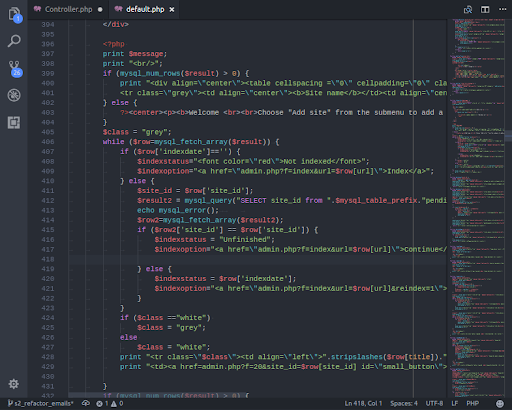Code quality can significantly impact any app as far as the performance is considered. This is why these days enterprises gave a lot of importance to the code quality for successful software implementation. If smooth and frictionless software functioning is something that you need to ensure, following the best coding standard is a very important aspect of this.
Great code quality is ensured by following an industry-acclaimed coding standard. This requires understanding the quality standards of code and the way it can impact the software applications and business processes.
What Precisely We Understand By Coding Standards?
In the coding process of a software application, there can be a variety of procedures. But while developing a program, a software development company needs to stick to certain guidelines that became standardized overtime for a positive impact. This coding standard ensures an easy understanding of the code besides maintaining consistency.
Consistency of the coding guidelines and standardization of the procedures actually reduces the anomalies and scope of contradictions in the programming process. Thanks to the coding standards, the developed program looks seems to be built by a single developer from start to finish.
Why Coding Standards Are Important?
Coding standards are important for maintaining the coding procedures as consistent and devoid of inconsistencies. When you hire dedicated developer, you should make sure that he is fully informed about these constraints and challenges corresponding to code quality.
Let us explain here briefly the key reasons for giving importance to coding standards.
Addressing Security Concerns
Most software applications become most prone to security threats and malware attacks if their code remains inconsistent. Without following any coding procedure, even the security experts can be clueless when trying to detect the root of a security threat.
Performance Issues
When you don’t follow any consistent and tested coding standard, you do not know whether the coding procedure will deliver the expected result. Naturally, lack of coding standard can cause problems with the server response, functionalities and other performance issues. With a proper coding standard, these problems can be minimized or eradicated.
The Importance Of Code Quality
Developing software applications to meet the standards of agility, performance and user experience already involves a lot of challenges and constraints. Why then software development should consider code quality as so important? Well, quality code means easily understandable code written with the standard syntax. This implies that the code itself boosts performance for the software application and reduces technical difficulties to a minimum.
Let us have a look at the key aspects of good code quality.
- The application code should be very much readable and understandable. This will reduce the development effort and make the development easier.
- The code must be clean so that further maintenance and upgrading becomes very easier.
- Low complexity in code and optimum clarity also ensures easier and more successful testing and debugging process.
How to Evaluate Code Quality?
As for evaluating and measuring code quality, there is obviously no one standard to follow. But considering the different parameters followed by different development teams, we can easily surmise them as the following.
Code Reliability
The probability of a software application running for an entire period without showing any performance issues or without succumbing to failure is what is considered as the reliability factor for a software application. The reliability of the software is measured by the time between two failure instances. Higher mean time between instances of failure or lower number of failures within this time is the sign of a reliable codebase.
Code Maintainability
Maintainability refers to the ease of maintaining the software. Some of the key aspects that make an impact on the maintainability include size, structure, consistency, and complexity of the code. Maintainability of the code also depends on the ease of understanding and testing the code. As there are multiple parameters for measuring the maintainability of the code, both automation tools, and human evaluation are required.
Software Testability
The testability of the software depends upon how easily and smoothly the software application can be tested or how the software allows testing efforts. To be more precise, testability depends upon how the quality assurance team can automate, control, observe and carry out testing procedures. To measure the software testability you can simply measure the number of test cases or testing efforts to detect the faults.
Software Portability
The portability of the software largely depends on how the same software can be used across a variety of environments. The challenge is, there is no single measure for evaluating software portability. The most effective approach is to test the code of the software frequently on different platforms when the development process is still on.
Code Reusability
In the modern software development environments, code reusability is one of the key parameters of evaluating the code. This evaluation involves measuring whether the code can be reused again in other operating system environments or platforms. Loose coupling and the modular character of code actually ensure optimum code reusability.
Important Tips to Ensure Optimum Code Quality
To ensure optimum code quality, the software developers need to confirm to some tested and tried practices and principles. Let us explain some of the effective tips for ensuring optimum code quality.
- Always follow the most preferred and standardized coding (style) standard for every language or framework. For example, PSR-2 style is regarded as the appropriate one for PHP.
- Maintain consistency in coding method, class, method variable names to ensure Optimum understandability.
- Provide proper documentation for blocks of code, classes, properties, and methods to ensure concise and clean coding.
- In coding follow proper design patterns to ensure optimum code reusability and extensibility.
- Always use code analysis tools in the CI environment to detect faults.
- Use automated testing tools to stay clear of bugs and ensure responding to different coding inputs.
- For overviewing code quality from time to time use tools like scrutinizer-ci and Codacy. These tools are great for finding issues in software projects.
Conclusion
Irrespective of the development languages, methodologies, frameworks or tools, code quality should be given optimum priority to ensure easy and smooth development, testing, maintenance, and less development cost.








